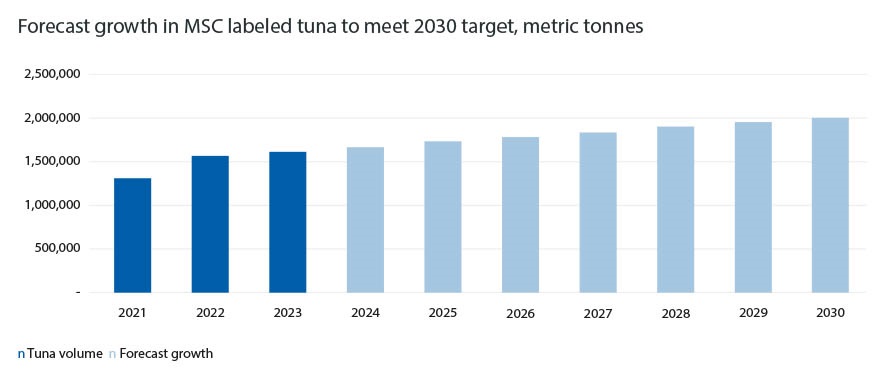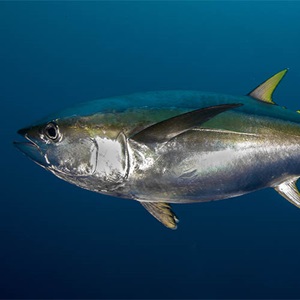Tuna plays a vital role in maintaining the health and balance of the marine food chain within our oceans. This is why tuna is so important to the MSC’s vision of having a third of the world’s global marine catch certified or engaged with the MSC program, by the end of the decade.
Achieving this goal is ambitious, but essential. It will contribute to global food security, support future generations who are dependent on tuna fishing for their livelihoods, and will make a significant contribution to the delivery of the United Nations Sustainable Development Goal 14 – Life Below Water. As one of the most widely caught fish on the planet, tuna represents a major component of that target.
53%
of global wild tuna catch from MSC engaged fisheries
33%
of all tuna caught in the world is MSC certified
138
MSC engaged tuna fisheries
Tuna is setting the pace towards the 2030 goal and outperforms most other certified species, except whitefish and small pelagic fish. More than half of commercially important global landings of tuna are either certified or in assessment (meaning fisheries are on their way to demonstrating the sustainability of their operations).
By 2030 we could see more than two-thirds of the world’s tuna fisheries engaged in certification, backed up by half a million tonnes of MSC labelled products on the shelf.
The MSC’s strategy sets out the organisation’s ambitions and priorities between now and 2030, and how it plans to work with partners to make vital progress on ending overfishing.
The strategy sharpens the focus on the fisheries, species and markets where our engagement will have the greatest impact – and with 159 MSC engaged fisheries, five major commercial species and a huge global market, tuna will play an important part.

Overcoming challenges
The path to sustainability is not without its challenges. The new version of the MSC Fisheries Standard has sought to address some of the issues facing tuna fisheries and will ensure MSC certified fisheries' position as leaders in sustainability. The new Standard increases confidence that shark finning does not take place in certified fisheries, affords greater protection to Endangered, Threatened and Protected (ETP) species, and requires fisheries to better manage the impacts of FADs (Fish Aggregation Devices).
Agreeing harvest strategies is complicated by the migratory nature of tuna, which travel thousands of miles across oceans. This requires collective agreements, often by many countries, who must juggle domestic fishing priorities with shared harvest strategies. Managing a range of different interests can make reaching an agreement challenging. However, a sustainable outcome needs to be agreed for fisheries to continue to meet the certification criteria.
We’re seeing this play out among stocks in the Western and Central Pacific Ocean (WCPO) and while it remains a significant challenge, there are positive signs that a harvest strategy for skipjack can be achieved in time to maintain MSC certification in the WCPO.
This cautious optimism, after many years of collective effort, is testimony to the many influential fishing, retail and conservation organisations supporting the ongoing verification of sustainable tuna fishing through MSC certification.
“The main challenge is the promotion of good governance at an international level because tuna are highly migratory fish.””
Managing Director of OPAGAC
Working together
Tuna fisheries have made substantial progress in improving their practices and 42% of all tuna caught in the world is MSC certified. As a market-driven program, achieving the 2030 ambition will only be possible with the support of partners and consumers who choose MSC products.
These consumers are more aware than ever of the impact their choices have on the oceans. According to a Globescan survey for the MSC in 2022, 73% believe that people should eat seafood from sustainable sources. The MSC’s mission is designed to tap into the positive influence of market forces, utilising seafood consumption and consumer demand for sustainable products to incentivise increased participation.
Everyone in the supply chain that is engaged with the MSC is already playing a vital part towards tuna's contribution to the 2030 goal of more than one-third of global landings sourced from MSC certified or engaged fisheries.
The MSC looks forward to working with valued partners to help identify new market opportunities and meet the challenges of the coming decade.



